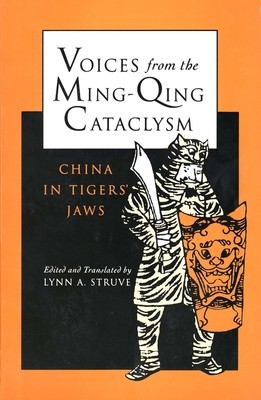
- We will send in 10–14 business days.
- Publisher: Yale University Press
- ISBN-10: 0300075537
- ISBN-13: 9780300075533
- Format: 15.3 x 23.2 x 2.3 cm, softcover
- Language: English
- SAVE -10% with code: EXTRA
Voices from the Ming-Qing Cataclysm (e-book) (used book) | bookbook.eu
Reviews
Description
This fascinating book presents eyewitness accounts of a turbulent period in Chinese history: the fall of the Ming dynasty and the conquest of China by the Manchus in the mid-seventeenth century. Lynn Struve has translated, introduced, and annotated absorbing testimonies from a wide range of individuals-Chinese and Europeans, missionaries and viceroys, artists and merchants, Ming loyalists and Qing collaborators, maidservants and eunuchs-all telling stories of hardship and challenge in the midst of cataclysmic change. Until now, biographies of individuals who lived in the late Ming and early Qing periods have been either in-depth studies of important intellectuals or portraits sketched from the historical record and amplified by the imaginations of present-day authors. This book is the first to provide actual comment from a variety of people in different social stations. Some of the documents made accessible to Western readers are little known even to Chinese scholars. The book also breaks new ground by offering examples of the diversity in Chinese historical writing: rustic histories, tendentious reports, self-serving memoirs, family letters, official memorials, and other forms of records. Together these translations provide evidence of the increasing articulateness about personal experience that characterized writing in late Ming times.
EXTRA 10 % discount with code: EXTRA
The promotion ends in 16d.23:06:02
The discount code is valid when purchasing from 10 €. Discounts do not stack.
- Publisher: Yale University Press
- ISBN-10: 0300075537
- ISBN-13: 9780300075533
- Format: 15.3 x 23.2 x 2.3 cm, softcover
- Language: English English
This fascinating book presents eyewitness accounts of a turbulent period in Chinese history: the fall of the Ming dynasty and the conquest of China by the Manchus in the mid-seventeenth century. Lynn Struve has translated, introduced, and annotated absorbing testimonies from a wide range of individuals-Chinese and Europeans, missionaries and viceroys, artists and merchants, Ming loyalists and Qing collaborators, maidservants and eunuchs-all telling stories of hardship and challenge in the midst of cataclysmic change. Until now, biographies of individuals who lived in the late Ming and early Qing periods have been either in-depth studies of important intellectuals or portraits sketched from the historical record and amplified by the imaginations of present-day authors. This book is the first to provide actual comment from a variety of people in different social stations. Some of the documents made accessible to Western readers are little known even to Chinese scholars. The book also breaks new ground by offering examples of the diversity in Chinese historical writing: rustic histories, tendentious reports, self-serving memoirs, family letters, official memorials, and other forms of records. Together these translations provide evidence of the increasing articulateness about personal experience that characterized writing in late Ming times.


Reviews